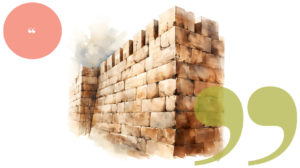Praying a Lot

Sometimes it seems as if the gates of Heaven are locked against our prayers. That’s the time to renew our efforts, as Yitzchak did.

Yitzchak pleaded (vayetar) with Hashem on behalf of his wife, for she was barren. Hashem granted his prayer ... ”(Bereishis, 25:21)
Parshas Toldos
R
ashi explains: He [Yitzchak] did much praying and entreating.
In Masechta Brachos, it’s written: “If a man prays and is not answered, he should pray again.”
In Tehillim, it’s written: “Place your hope in Hashem, be strong and courageous in your heart, and place your hope in Hashem” (27:14).
There’s a limit to how many requests any one person can hear. When he hears a request for the first time, he listens. The second time serves as a reminder. The third time, he announces that he has already heard the same request three times. When the fourth time rolls around, he tries to contain his annoyance by remaining silent. If the request is made for a fifth time, he exclaims, “Enough! Leave me alone!”
Every parent who has heard the phrase, “Buy me! Buy me!” has reached that breaking point, perhaps calling her child “a nuisance,” a “terror,” or “a pain in the neck.” Every parent understands perfectly well why such nagging interactions usually end with a round of yelling and threats, from all parties involved.
That’s why we tend not to repeat our own requests. The neighbor promised to lend you her vacuum cleaner. You asked her once, shyly. You reminded her a second time, and stammered uncomfortably the third time. Rather than mention the vacuum cleaner a fourth time in one week, you took the rug out on the porch and beat the dust out of it with a rug beater. How much can you bother a person?
The cousin who offered to give you hand-me-downs for your daughter, once her own daughter outgrows them. The friend who said he would speak to the rosh yeshivah about accepting your son for the coming zman. The colleague at work who promised to teach you helpful shortcuts on the new computer program. You asked once or twice, and even a third time out of desperation; then you gave up. Not because you were no longer interested, but because you didn’t want to be a nuisance. You wanted to avoid an unpleasant situation.
“There’s a great difference between requesting from Hashem and requesting from other human beings. When you ask a favor of your friend, and he doesn’t follow through, you know that if you keep nagging him about it, he will get angry at you. But with Hashem, it’s different. Hashem desires our prayers and entreaties, and enjoys hearing them repeated over and over again. Chazal wrote that Moshe Rabbeinu davened 515 times, k’minyan va’eschanan, the numerical value of “I entreated.” And that if he would have prayed just once more, Hashem would have fulfilled all of his requests” (Shaarim B’Tefillah, Rabbi Pincus).
There is only one door that you can knock on as often as you like. It’s never too early or too late, and you never need to worry that you are disturbing anyone. Another chapter of Tehillim, and then another. More tears, and an extra prayer. Forty days straight, and then just one more Minchah. “Please, please, Hashem!” we cry, from the depths of our hearts. Haven’t we asked Him already? It doesn’t matter. We’ll ask again. We won’t lose hope. We’ll break down the gates of Heaven with our tears. We know that we’ll be heard as often as we pray, and so we beseech our Creator unrelentingly.
We bring up the same topics all the time: shidduchim, parnassah, educating our children, shalom bayis. “Hashem, I beg of you … ” We prayed yesterday, and last week. We prayed when we lit the Shabbos candles, and after reciting Tehillim in the waiting room at the dentist. “Hashem, please!” The Heavens are infinitely vast. There’s plenty of room up there for all of our prayers, and more.
“The more a person prays to Hashem, the more beloved he becomes before HaKadosh Baruch Hu … We don’t pray to Hashem only because we’re required to by halachah. Pleading to Him repeatedly is a unique form of prayer, and each time we pray, we experience anew a sense of closeness to Hashem” (Shaarim B’Tefillah).
Sometimes it seems that locked doors are preventing our prayers from being answered. But even though we can never know the reason for the locks, we can be sure that every time we knock and cry and beg for the door to open, we are heard. The prayers we send are all saved in a personal “bank account,” and are often put to use later in life, when we don’t even know how much our prayers will be needed.
As it is written in Tehillim: “You have counted my wanderings; put my tears in Your bottle. Are they not in Your book?” (56:9).
Continue to pray, and beg, and plead. In Shamayim, your prayers are valued, your voice is heard. If you want the doors to open — never stop knocking.
(Originally featured in Family First, Issue 64)
Oops! We could not locate your form.







